Writer Maliha Masood is good at getting inside a culture – and sharing it. We’ve interviewed her on Wandering Educators before, for her interesting book, Zaatar Days, Henna Nights: Adventures, Dreams, and Destinations Across the Middle East. In that memoir about backpacking in the Middle East before 9/11, she notes that learning about yourself, while in a different culture and place, isn't always easy.
Maliha has a new book out, entitled Dizzy in Karachi, which the publisher sent to me for review. I have to tell you, once I started, I could not put it down. Make room in your life for this book, because it is an excellent read. It’s a story of a homecoming, of sorts, and of finding a place in this multicultural world we live in. It’s also a beautifully written ode to a country (Pakistan), a culture, and a people that are often misunderstood.
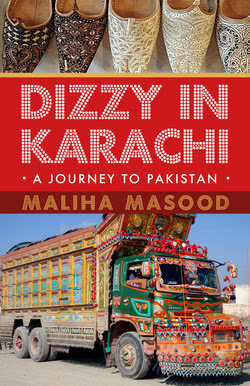
Piqued your interest? Read a bit here, about Maliha seeing the Golden Peak of Karoun:
You try to summon the words but they are just glossy adjectives. You have no choice but to string them together like beads and lasso it onto the object of affection which will forever outsmart your capacity to comprehend what you are seeing, for it is otherworldly and unknowable.
And on visiting a rural, impoverished village:
All this show stopping mountain beauty doesn’t obscure the impoverished conditions these villages have to endure. It almost makes me feel foolish and decadent to come up here to take pretty shots of the indigenous culture and their quaint ways of living.
And on returning to a homeland, and seeing life as it is now, as opposed to in your memories:
Five months of living and traveling in Pakistan have shown me what could have taken years to understand had I not taken the trouble of coming back…In so doing, I slipped through the cracks and unearthed my shadowlands. What I came away with is not what I was expecting to find…What did bind me to the country were the people I met there, not my own family, but total strangers who welcomed me with open arms and allowed me a precious glimpse into their world.
This book is at once a personal journey and a timeless one, that of discovering yourself through travel, through opening your eyes to difference, and welcoming said difference gracefully. Maliha does all that, with beautiful, poetic words that make this reader long for more
We caught up with Maliha to ask her about Dizzy in Karachi, inspiration, revisiting a home culture, and more. Here’s what she had to say…
Please tell us about your book, Dizzy in Karachi...
Dizzy in Karachi is about the summer I spent in Pakistan, living, working, and traveling. I was born and raised in Pakistan and left the country when I was eleven years old to immigrate to the United States in 1982. I did not go back to Pakistan until 2003, more than two decades later. So the book is largely about this homecoming trip, and describes in great detail the diversity of all the places and people I encountered in Pakistan.
There are 3 main layers to Dizzy in Karachi. One is a travelogue that’s very immediate and reads like a best friend’s travel diary. The second is cultural commentary that shows the hidden side of Pakistan, the one we are not hearing about from the media. The third is historical analysis that is meant to provide a deeper understanding of Pakistan and deflect stereotypes.
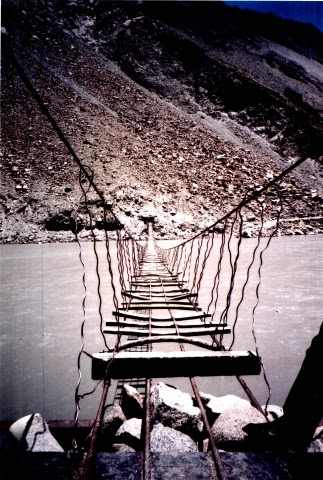
What inspired you to write this book?
I was inspired to write this book when I heard my father’s story about attending a Dizzy Gillespie concert in Karachi. I was very intrigued that my Dad had been exposed to jazz and big band music in a country we routinely associate with terrorism. This was during the 1950’s, when Pakistan was much more secular and cosmopolitan. I wanted to find out how the place had changed over the years and when I went back to Pakistan in 2003 and traveled quite freely through all parts of the country, I began to see so many elements and characteristics in terms of culture and society that are not known in the West.
I wanted to write a book about Pakistan that shows this hidden side, the one beneath the headlines. My goal is to open a new dialogue on Pakistan that’s not just about politics and the latest headlines. One of the biggest problems contributing to all the fear and suspicion is that the very people talking about Pakistan in the media are not actually going there to visit. So much of the perception is not fact based. It’s just perceptual. You cannot understand Pakistan through politics alone. You also need to understand the culture and history, and travel is the only way to get accurate eye witness information about a place. There’s a lot of interest in Pakistan and people want to know more than just sound bites. This is why I wrote Dizzy in Karachi…as a means to educate and inform. As a Pakistani-American, grounded in both Eastern and Western cultures, I provide a dual perspective - so my travels have this quality of seeing through a two way mirror. That’s what makes the book so interesting and unique.
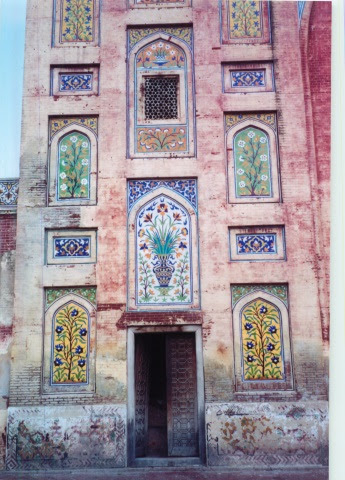
You took this trip to Pakistan in 2003 - why did it take a decade to get it in print?
Yes, it was a long stretch. And here’s why. I was in graduate school when I went to Pakistan in 2003. I lined up a summer internship in Pakistan to get some international field experience and also to give myself a legitimate reason to visit Pakistan after such a long absence. I didn’t want to just wander about aimlessly. It was a very purposeful journey and I think that’s an important element of all good journeys. Your travels are so much richer if you go with a sense of purpose.
I was studying International Affairs in Boston and I wanted to pursue foreign diplomacy as a career. After I graduated in 2004, I had a choice of working in DC in a boring administrative job (which was all I could find right after school), or returning home to Seattle to get married to someone who had been patiently waiting 4 years. I chose marriage and since there were not a whole lot of international jobs in Seattle, I turned toward writing.
I started working on my first book, Zaatar Days, Henna Nights, which was also a travelogue based on an earlier trip I had taken to the Middle East. That project took 3 years from start to finish. After that I became a mom and began a new journey known as motherhood. By the time my son was 15 months old, I thought of going back to writing as a way to carve out some alone time and exercise my brain, which was losing some serious gray matter from all the diaper changes and toddler tantrums.
So I started working on Dizzy in Karachi in the winter of 2010 and it was a very hard thing to create in terms of structure and narrative. I tried several different versions until I found the thread that stitched the whole story. And that was my Dad’s recollection of Dizzy Gillespie in Karachi. So I rewrote my entire manuscript by blending my travel adventures with historical and cultural references which took quite a bit of research. Once I was satisfied with a manuscript, I started the process of trying to get it published, which was not easy. But eventually, I found a local publisher who understood the importance of the book and then the whole thing came together quite easily. So yes, it took a long time to get this out in the world. But I’ve been busy!
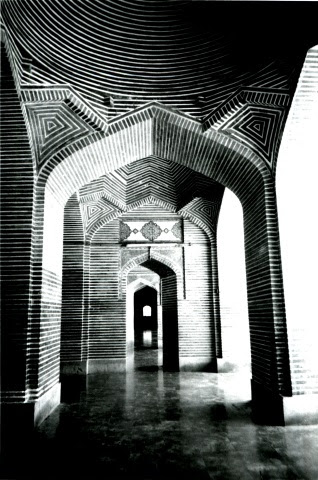
What surprised you most about revisiting your home culture?
Since I hadn’t been back in over two decades, I was surprised by how Westernized it appeared. I don’t mean in terms of people’s outlook and mentality, which was not always the case, but in terms of the big cities like Karachi, which had become so much more commercialized. There were malls and office towers, trendy restaurants and art galleries every which way. I hadn’t expected so much of this. But then again, Karachi is the economic hub of Pakistan and it’s a port city so it has always been a magnet for business and commerce. In the Western media, Karachi is depicted as a terror den. But we need to add this other layer to the city’s personality…all the modern touches that make Karachi so vibrant and lively.
When I was working in Islamabad, I lived with a group of college students. They were all girls studying computer science and they all had cell phones and loved to watch MTV videos. And we spent a lot of time watching satellite television. My roommates were addicted to American sitcoms like Friends. I was mostly taken by a Pakistani talk show hosted by a transvestite. That’s quite a stretch for a conservative Muslim country. In terms of local media, Pakistan has a proliferation of newspapers, magazines, and television and radio stations. I can’t pin down an exact number. But there is a great deal of choice and variety, like GEO TV and Indus, that provide all kinds of interesting programs from travel documentaries to reality shows to fashion shows. I hadn’t expected Pakistani media to be so creative and vibrant. Surprisingly, the independent media really flourished during Musharraf’s regime and both print and network media were quite outspoken about government policies. I was surprised to see a strong Western tradition of critique and questioning the status quo. Pakistan is a lot more modern and Westernized than it appears on the surface.
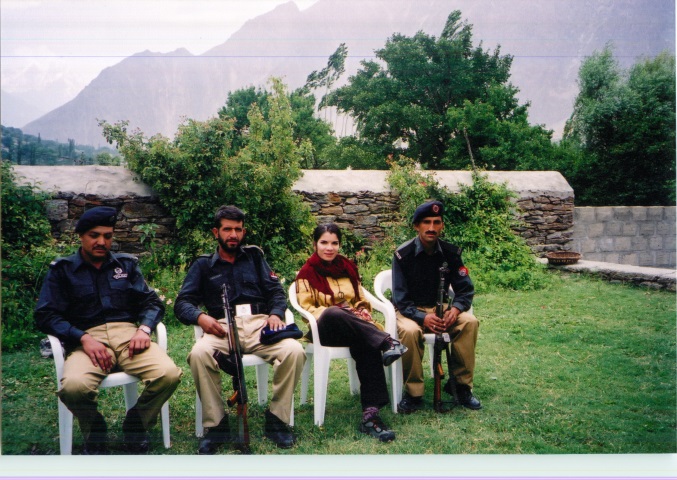
What role does Pakistan play in your life right now? Have you gone back? Do you feel the need to?
Pakistan will always be an important aspect of my identity. It’s my birthplace and the seat of my childhood. There’s a very strong emotional draw to the place and lots of conflicting emotions, from pride to embarrassment. Now that I’m a mom, I think it’s important to pass along my cultural heritage to my son and when he’s older, maybe we’ll travel there together. He’s only 4, but I know he’ll be a good traveler because he has a very inquisitive nature and loves to explore new things.
I haven’t been back since my trip in 2003 and I don’t feel a pressing urge to go back right away. I don’t feel the need because I have a deep connection to Pakistan mostly because I got my shoes dirty and took to the road and traveled so widely in just about every region of the country. Each chapter in the book focuses on a particular region, so it’s very place-oriented. I was very lucky to have had such a rich travel experience. The more time goes by, the more it takes on a dream-like quality. But it was all real. I will never forget my trip to Pakistan. It’s something that will stay with me forever.
If someone has grown up in a different culture than their home culture, can they ever truly go home?
Not really. Once you leave your country of birth, you are uprooted forever and you can’t reverse the process. You have to carve out a new identity and adapt to a new culture that becomes your new home. That’s what it was like after I moved from Karachi to Seattle. I had to say goodbye to Karachi Maliha and find a new Maliha in Seattle.
I wanted to fit in and get rid of my British accent. I didn’t want to be stand out as a foreigner, though my name was a dead giveaway that I was from somewhere else. I spent a lot of time after school watching the Brady Bunch and Gilligan’s Island to develop an American accent. It worked against me when I went back to Pakistan because I was taken for an outsider, an American girl from Seattle who didn’t know the first thing about Pakistan. I realized then that I wouldn’t ever able to fit in as a local. I might share the same religion and my name was more familiar in Pakistan than in America, I was still as outsider because I had been away for so long. So my home was no longer in Pakistan. It was America that was home. But I also think there are other levels to what we mean by home. It’s not just geography. It’s also language, which for me has always been English since I grew up bilingual - and though I speak five languages, I feel most comfortable with English, especially when I write. Home is also food and on that front, my love of spicy South Asian curries will always win over meatloaf and tuna casseroles. So I have a very fluid concept of home. And because I’m an immigrant, I can feel at home everywhere and yet nowhere.
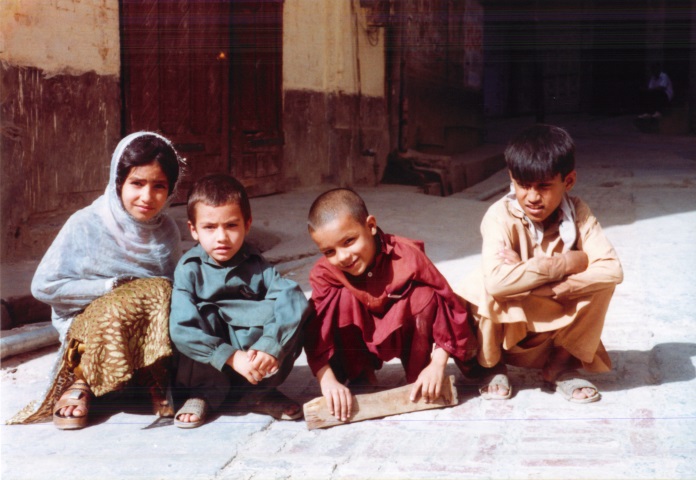
Is there anything else you'd like to share with us?
I’d like to reiterate the point that the majority of commentators on Pakistan haven’t actually traveled to the country. And yet they speak about it with so much authority. How can this be without having any real experience of the place you’re talking about? It makes no sense.
I’m not saying that we should all book plane tickets and travel to Pakistan. But I do think people need to be a bit more open to the idea of traveling there, despite the dangers and threats. There will never be an ideal time to visit Pakistan or any other country with geopolitical importance in the Middle East or South Asia. But we need to evaluate and differentiate the threats from the actual to the perceived. There are parts of India or Nepal that are just as dangerous, yet those countries seem to be more tourist worthy than Pakistan. Much of the danger in Pakistan is in targeted regions, like the Tribal Beltway bordering Afghanistan. In the bigger cities, like Karachi, Lahore, and Islamabad, your biggest danger is just crossing the road in the anarchy of South Asian traffic. And I haven’t heard of any terrorist attacks in the historical tourist sites. Northern Pakistan was a Mecca for mountaineering pre 9/11. But people have been more reluctant to visit in recent times. Again, we need to be careful and distinguish fact from fiction. The media just tells us the horror stories. And it scares us. Rightly so.
I know it will be tough to convince people to see Pakistan as a travel-worthy destination but there’s so much to discover. And I hope that in some small way, Dizzy in Karachi will get people asking more questions about Pakistan and expand their curiosity to learn more about the country. For intrepid adventurers, my book is like an insider’s guide because I actually braved the elements and went to a lot of hard to reach places, like the Khyber Pass and the Karakoram Highway that links Pakistan to China. For armchair travelers, Dizzy in Karachi is a fun read, like a time travel book about a fascinating country full of contradictions that needs to be better understood.

For more information:
https://www.facebook.com/dizzyinkarachi
Twitter @ Maliha-Masood
All photos courtesy and copyright Maliha Masood
